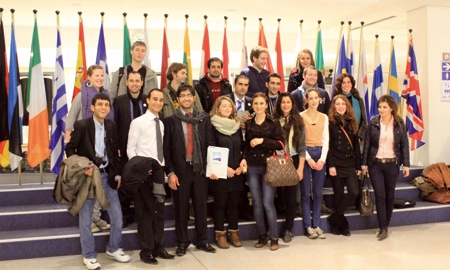Since the fall of the Ottoman Empire in the 1920s right up to 2003, Kurdistan suffered under political and military regimes which pretty much obliterated the nation. Now with political stability and economic prosperity, the Kurdish government can make plans to improve every sector from higher education to agriculture.
Dr. Ali Saeed Mohammad, the Minister of Higher Education & Scientific Research, explains in detail his plans to make the workforce more skilled and talented and to create a more knowledge-based economy.
“Under the umbrella of the Ministry of Higher Education & Scientific Research we have 11 private universities and 10 public universities, along with two technical foundations. Our ministry supervises all private and public universities with our roadmap for quality and reform. For scientific research programs, we hope to have Ph.D. projects with centers of excellence and good universities in the U.S. and Europe. We also hope to send our teaching staff for training, post-graduate education, refresher courses, and sabbatical leave,” he says.
Two years ago, in a very ambitious move backed by a significant budget, the Kurdistan Regional Government decided to pursue the Human Capacity Development Program (HCDP), allocating $100 million a year for new university graduates to study for their Masters and Ph.D.s abroad.
“The economic situation in the region has improved, so we can provide all schools with electricity, heating and air conditioning. We can provide them with new books and we can hire more teachers.”
Dr. Asmat M. Khalid, Minister of Education
-------------------------------------
“I hope that we have more and
more areas of cooperation, relations, and investment between the U.S. and Iraqi Kurdistan.“
Dr. Ali Saeed Mohammad, Minister of Higher Education & Scientific Research |
“This is part of the nation building we are planning for,” says Dr. Saeed Mohammad. “We want to secure human rights, as well as rights for women, children, and the disabled. The Ministry of Labor has plans for the disabled and unemployed.
“On the whole, our goals in higher education and scientific research are to follow our roadmap for quality and reform; upgrade the standards and raise the potential of our teaching staff; and create opportunities for higher education and scientific research.”
Ministry of Education Dr. Asmat M. Khalid explains that there are very specific plans to reduce illiteracy in Kurdistan by having more schools and more teaching programs.
“The illiteracy rate has been reduced significantly, and now we can provide all schools with electricity, heating and cooling. Students have new books and we can hire more teachers. We have a very high birth rate in Kurdistan – it is very close to 3%, which is in line with four or five top countries,” he says.
“On the other hand, people are moving back to Kurdistan from Iraq and Turkey. Also, a lot of people who fled from other parts of Iraq for one reason or another have came back. This results in a very fast increase in the number of students.”
Over the next five years, Dr. Saeed Mohammad hopes to have more definite educational links between the U.S. and Iraqi Kurdistan.
“I hope that we have more and more fields and areas of cooperation, relations, and investment between the U.S. and Iraqi Kurdistan. This will help stabilize our government. We can benefit from U.S. expertise in the fields of higher education and scientific research.
“We need to send our graduates for training in the U.S. in engineering, nanotechnology, physics, information technology, etc. We hope that the Kurdistan region will be more and more of a focal point for the United States, and they will help us to establish our democracy, strengthen human and women’s rights, and plan for the future. This is our vision and the ministry’s policy,” he says.
Dr. Khalid believes that the education system in the region of Kurdistan still needs lots of reforms and improvements.
“At the end of the day, you would like better graduates, but universities still have to improve. The teachers we are getting from the universities are not very well qualified to come and teach the new generation. The cycle is independent and dependent, and vice-versa. We are depending on teacher graduates from the universities, but they are not very well qualified. We will start a huge educational reform program in Kurdistan.
“It is a 12-year program and it will take time for us to reach an outcome. It is true that the education system should be improved, and at the same time, universities should revise their curricula and outputs to improve the level at graduation,” he says.
The economy of Kurdistan is currently expanding; this year Gross Domestic Product is forecast to grow by 12%. With this in mind, better infrastructure, especially of fiber optic networks, is essential for the continued development of the education system.
“Infrastructure is developing fast in Kurdistan, and there is construction everywhere.Telecoms in Kurdistan today are not bad, but they are not at the level we want. We are looking to grow faster to achieve international standards in every sector. We are thinking about having railways and more airports in Kurdistan. We would like to have more links with international flights at cheaper prices, but education has to be a priority,” concludes Dr. Khalid.

0 COMMENTS